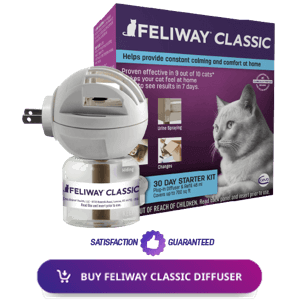How To Get My Kitten To Stop Biting
Does your kitty sometimes get carried away and leave you with a sharp bite or scratch? Though occasional play biting can be expected, it's important to teach your pet not to scratch or bite you while they are young. That way, you'll still be able to play with your happy, friendly kitty once they're grown - without the risk of injury! Excited, playful kitties may want to grab onto your hands and feet, but it's important to teach them that only toys are for attacking! Otherwise, as they become bigger, their biting may cause accidents, and end up hurting you. So the next time your playful pet jumps at your ankles or chews your hands, react by saying a sharp 'no!', redirect them onto a toy and stop playing for a few minutes. To reinforce the 'toys, not hands!' message, never use your hands or feet as kitty playthings. Instead, always use a toy - ideally one held at a distance from your body, such as feathers on a string, balls or stuffed toys. Scratching is a natural behaviour for cats. They all need a scratching post to stretch their claws and mark their territory. In play, your kitty may use their claws as hunting and pouncing practice - play aggression is normal! But if this practice is on you, work to redirect your kitten to their scratching post or toys every time the claws come out. You can recognise when your kitty is planning to pounce and scratch by their body posture - dilated pupils, tail moving back and forth, and ears flat to the head are all signs of an incoming kitty attack! Training your kitten to use their scratching post should be another key part of their lessons. Make sure every kitty in your house has access to at least one scratching post each (plus one extra) to keep claws in check! If your kitty becomes overly aggressive and bites or scratches you a lot (rather than an occasional accidental bite), make sure you teach them that it's not ok! When this behaviour occurs, be sure to stop fussing or playing with your cat immediately. Step away from your pet and out of striking range, and do not fuss or reward them with attention. Walking away from your pet, ignoring them and leaving them alone to calm down with no interaction (do not talk to them or look in their direction) for 5-10 minutes is the best way to stop aggressive play. Be sure to do this every time your pet becomes aggressive, and they will soon learn that bad behaviour means that they will be ignored! It is best to teach this while your cat is still a kitten as they are still in a learning phase of development. For adult cats, this method works best with affectionate kitties who will miss your attention! Keep in mind that cats respond best to positive reinforcement, so always stay calm and be patient. Your voice can be a great help to let your pet know how you feel! To stop biting and scratching behaviour, say a sharp 'no!' or 'ouch!' command whenever your cat nips you. This sound, combined with ignoring unwanted behaviour can reinforce that you are unhappy. However, never shout at your cat. Always use a calm tone and never lose your temper. Your pet won't understand, and an angry reaction may cause your cat to become nervous or fearful, and worsen their behaviour. After a few minutes, when you feel it is time to resume play, continue to use your voice to reward good behaviour, and calm play. Always reward good behaviour and stop whenever your pet gets over excited and too rough. Routine is important for our cats, and daily play sessions of 10-15 minutes, two or three times a day, can help your cat bond with you, feel relaxed and happy at home - and get rid of any excess kitten energy or aggression! Teaching your kitten how to play calmly is an important part of your journey together, and teaching them not to bite or scratch during play is a key part of that. If you reinforce good play behaviours, and ignore unwanted ones everyday, your pet will soon learn how to behave. Though it may be tempting to fuss or continue playing with your kitty after they bite or scratch you, this attention can reinforce that these behaviours are ok - they may even begin to bite or scratch you for more attention. Instead, always step away and ignore your cat immediately when unwanted behaviour occurs. If biting or scratching continues, or your cat seems unusually aggressive, always check with the vet that there is nothing wrong with your pet's health. Pain or illness can cause your cat to feel defensive, and make them more likely to attack. A stressed or anxious kitty may also be more likely to display biting or scratching behaviours. To help your kitten feel calm, make sure their environment is just right. Check that you have provided enough resources for every cat (including hiding spots, access to food, water and litter trays and scratching posts), make sure your kitty has a regular routine for meals and playtimes, and try to limit any extra noises or changes in the house. Using a FELIWAY CLASSIC Diffuser, plugged into the place where your cat spends the most time, can help to support a calm environment, and is clinically proven to limit scratching, spraying and hiding behaviours.
1. Focus their playful energies on toys, not hands!
2. Redirect to a scratching post
3. Stop play, and ignore biting or scratching behaviours immediately

4. Use your voice
5. Play with your kitten every day
6. Avoid reinforcing unwanted biting or scratching behaviour
7. Check that your kitty is healthy
8. Create a calm kitty environment

How To Get My Kitten To Stop Biting
Source: https://blog.feliway.com/us/8-ways-to-stop-a-kitten-from-biting-and-scratching
Posted by: breedingalliat.blogspot.com

0 Response to "How To Get My Kitten To Stop Biting"
Post a Comment